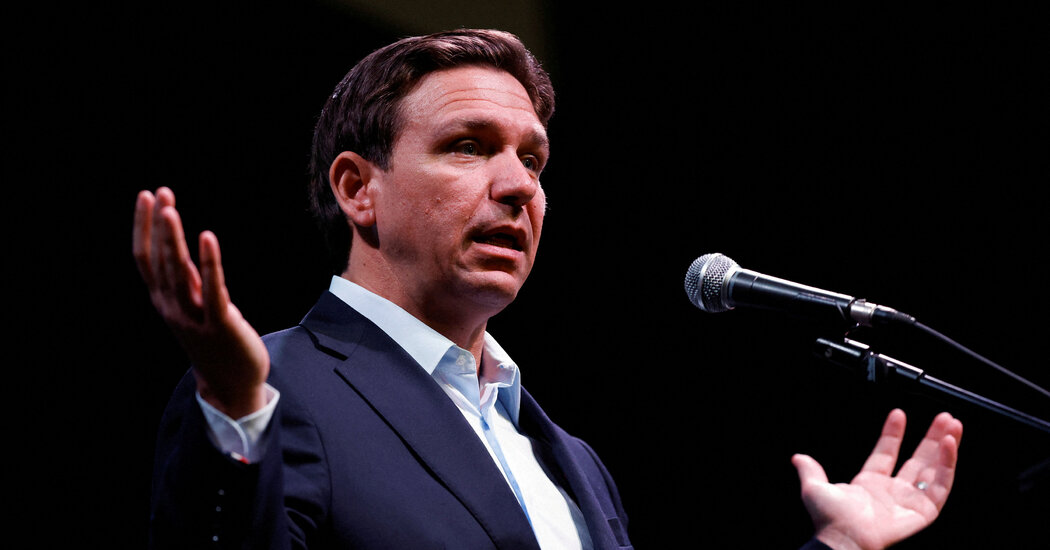DeSantis Leans Into Vaccine Skepticism to Energize Struggling Campaign

The Florida governor has so far found little success in getting his criticism of the Trump administration’s Covid-19 policies to stick, but that has not stopped him from trying.
Gov. Ron DeSantis had hoped that his response to the coronavirus pandemic, which helped propel him to a resounding re-election in Florida last year, would produce similar results in the Republican presidential primary.
But despite leaning into his record on Covid-19, Mr. DeSantis remains adrift in the polls and badly trailing former President Donald J. Trump, whose administration he has castigated for how it handled the pandemic. Mr. DeSantis points to how he guided Florida through the pandemic — reopening schools and businesses early and forbidding local governments and businesses from imposing mask and vaccine mandates — as a model for the nation.
While Mr. Trump recently warned against the return of “Covid hysteria,” his administration led the rapid development of the Covid-19 vaccines that many Republicans now question. Studies show the shots prevented millions of deaths and hospitalizations in the United States. But over the summer, Mr. Trump acknowledged to Fox News that the shots were “not a great thing to talk about” in his party.
Mr. DeSantis has sought to exploit that anti-vaccine sentiment as a way to pry primary voters away from Mr. Trump, publicly casting doubt on their safety and effectiveness against the coronavirus. Scientific experts have labeled his views — and his administration’s decision to recommend that Floridians under 65 not receive the updated Covid-19 shot — as dangerous and extreme, even as many acknowledge that the school closures that Mr. DeSantis opposed went on for too long in some states.
On Wednesday, Mr. DeSantis again tried to rally vaccine-skeptic voters to his side, headlining a “Medical Freedom” town hall at a ski area in Manchester, N.H., alongside Florida’s Surgeon General, Dr. Joseph Ladapo. During the event, which was hosted by Mr. DeSantis’s super PAC, the Florida governor insisted that federal public health agencies had spewed “nonsense” throughout the pandemic and needed a complete overhaul.
He claimed that the Covid shots have been rolled out without proper clinical studies and that federal officials had either lied or were flatly wrong about the benefits and risks — a view that has been roundly condemned by a wide array of public health experts, academics and scientists.
“We know the federal government muffed this in many different ways and we need a reckoning,” the governor said.
Mr. DeSantis has found little success in getting his criticism of the Trump administration’s Covid-19 policies to stick, demonstrating the former president’s remarkable resilience with Republicans in the face of criminal indictments, growing attacks from rival candidates and his own verbal missteps.
In interviews with The New York Times across the early nominating states, many voters have said they do not fault Mr. Trump for his response to a new and unknown virus, saying that he did his best in an uncertain situation. Such attitudes are common even among some of Mr. DeSantis’s supporters.
“I’m always inclined to cut President Trump some slack on the epidemic because he was listening to people who supposedly knew what they were talking about,” said Richard Merkt, 74, who attended the town hall on Wednesday and said he plans to vote for Mr. DeSantis in the New Hampshire primary. Mr. Merkt is a former New Jersey assemblyman who has run for office in New Hampshire, where he retired.
Bob Wolf, an undecided Iowa voter, said he admired Mr. DeSantis’s handling of the pandemic but did not blame Mr. Trump. “When Trump was in charge, I don’t think everyone knew what the facts were,” Mr. Wolf, a 44-year-old firefighter, said in an interview this fall.
Still, Mr. DeSantis is clinging to his Covid policies as a pillar of a campaign.
In September, he and Dr. Ladapo recommended that Floridians under the age of 65 should not get the updated Covid shot that targets the virus’s more recent variants. That guidance contradicted the advice of the Food and Drug Administration and the Centers for Disease Control and Prevention, which had recommended the shot for most Americans six months and older.
At the town hall, Dr. Ladapo praised Mr. DeSantis.
“To read the data, to reach a conclusion, to know that conclusion is right, and all of these Harvard Ph.D’s and M.D.’s are wrong? That takes courage,” said Dr. Ladapo, who himself holds degrees from Harvard.
More than 1.13 million Americans have died from Covid-19 since the pandemic began, with the fatality rate far higher for the unvaccinated than for the vaccinated. A partisan divide has emerged in the nation’s death rate, which has been greater in Republican-leaning counties. Republicans now tend to be more skeptical than Democrats of vaccines of all types, a post-pandemic development.
Florida was an early leader in vaccinating older residents against Covid, but achieved far lower vaccination rates for younger age groups as the governor shifted from a vocal advocate to a skeptic of shots. A New York Times analysis in July found that unlike the nation as a whole, Florida lost more lives to Covid after vaccines became available to all adults, not before.
Mr. DeSantis has suggested that he is the only Republican who can capture general election voters who are angry about the government’s response to the pandemic, particularly with Robert F. Kennedy Jr., a prominent anti-vaccine activist and conspiracy theorist, in the race as a third-party candidate.
“RFK Jr. will be a vessel for anti-lockdown and anti-Fauci voters, if Trump is the nominee,” Mr. DeSantis said last month, in a reference to Anthony S. Fauci, the nation’s former top infectious disease expert, whom he has said should be prosecuted. “If I’m the nominee, they all go to me.”
When Mr. Kennedy was still running in the Democratic primary against President Biden, Mr. DeSantis even suggested that the longtime liberal might have a place in his presidential administration — a clear sign that he hoped to court supporters of Mr. Kennedy who share his views on vaccines.
But so far, Mr. DeSantis’s efforts to break through in the Republican field have failed.
Although the Florida governor generally has high favorability ratings among G.O.P. voters, Mr. Trump has maintained his dominant lead in Iowa, New Hampshire and South Carolina. One recent poll showed that former Gov. Nikki Haley of South Carolina had caught up to Mr. DeSantis in Iowa — where he has staked his entire campaign. Polling averages put Ms. Haley ahead of him in both New Hampshire and South Carolina.
Not only have the governor’s criticisms of Covid vaccines produced few political dividends in the primary, scientific experts characterize them as dangerous public health policy.
Dr. Paul A. Offit directs the vaccine education center at Children’s Hospital of Philadelphia and serves on the F.D.A.’s panel of outside vaccine experts that authorized the vaccines. He said tens of millions of Americans under the age of 65 suffer from underlying medical conditions that increase their risk of severe disease or death from Covid.
“Does he think that only those over 65 are at risk?” he asked, referring to Mr. DeSantis’s refusal to recommend the shots for younger age groups. “We’ve moved, sadly, from scientific illiteracy to scientific denialism. Science doesn’t matter.”
Dr. Scott Rivkees, Florida’s state surgeon general for more than two years under Mr. DeSantis, said the state was now quite isolated in its approach to Covid vaccinations.
“I’m not aware of other states that have said that individuals younger than 65 should not get vaccinated against Covid,” said Dr. Rivkees, who left the administration in September 2021 and is now a professor at Brown University’s School of Public Health.
Mr. DeSantis’s team dismisses such criticism as more grousing from a “tyrannical medical establishment” that led the nation astray during the pandemic.
“His actions have exposed the ‘experts’ for the political actors that the country now knows them to be — and that’s why they continue to attack him with failed science and fake narratives,” Bryan Griffin, press secretary for the DeSantis campaign, said in a statement. He said that Mr. DeSantis had “prioritized the truth” as governor and would “do the same for our nation as president.”
Sarafina Chitika, a spokeswoman for the Democratic National Committee, said in a statement: “Ron DeSantis’s attempt to resurrect his old and tired anti-vaccine tantrum today is a reminder to voters that he played political games with Florida’s Covid response at every turn in a cheap effort to score political points with the extreme MAGA movement.”
Public health authorities give Mr. DeSantis credit for insisting that Florida schools open their doors to students in the fall of 2020. Many experts now agree that too many school districts offered only remote learning for far too long. But they have heaped criticism on him for casting doubt on Covid shots.
Mr. DeSantis claimed Wednesday, as he has previously, that federal authorities misled people into believing that the vaccines prevented infection. In fact, shots were authorized based on evidence that they reduced risks of severe disease and death, not infection.
The governor also claimed that Dr. Ladapo had properly identified risks of the shots for young men. But the heads of the F.D.A. and the C.D.C. publicly warned Dr. Ladapo that his statements were misleading, saying such misinformation “puts people at risk of death or serious illness.”
Mr. DeSantis also played up a state grand jury investigation he instigated nearly a year ago into what he claimed was possible criminal misconduct by Covid vaccine manufacturers. Critics labeled it a political stunt, and it has so far come to naught.
But at the town hall Mr. DeSantis suggested that the issue would continue to come up on the campaign trail, saying: “There may be a report or something like that pretty soon.”
This article has been archived for your research. The original version from The New York Times can be found here.


